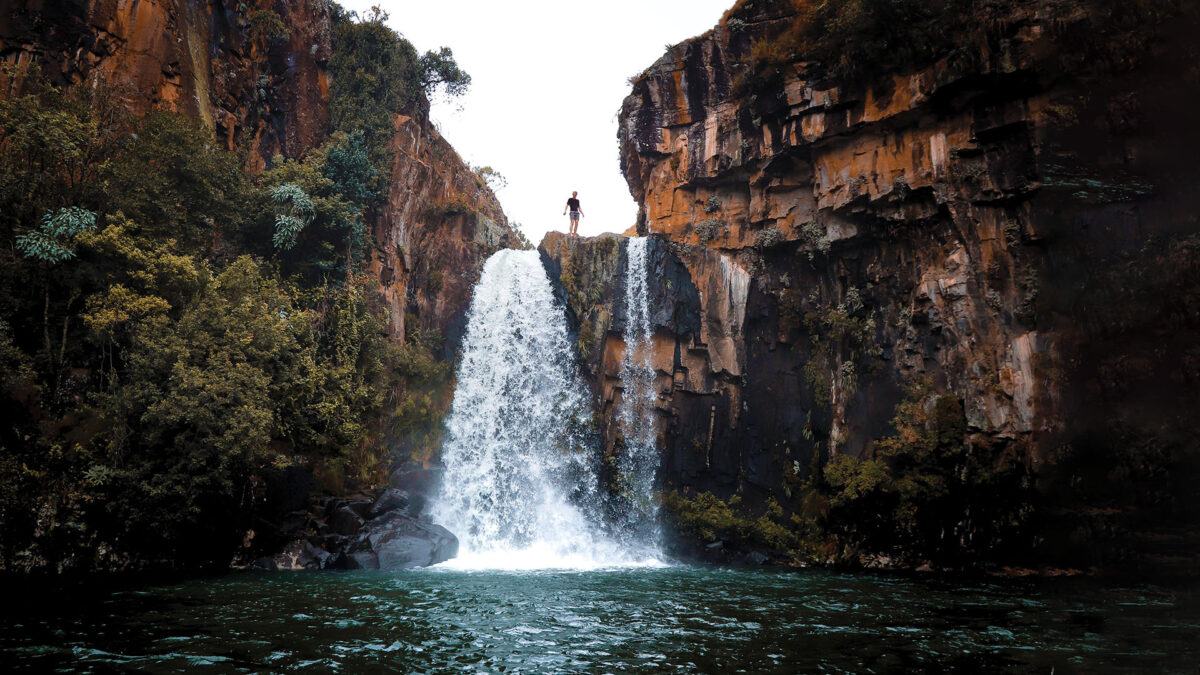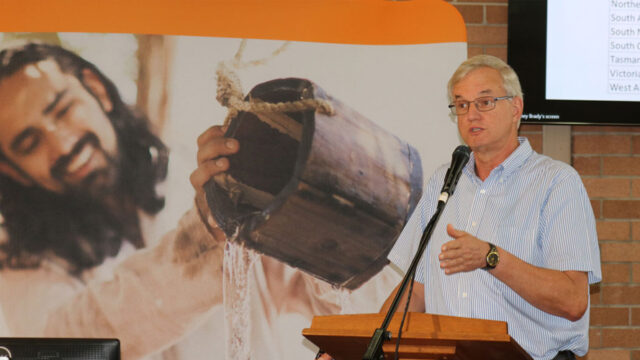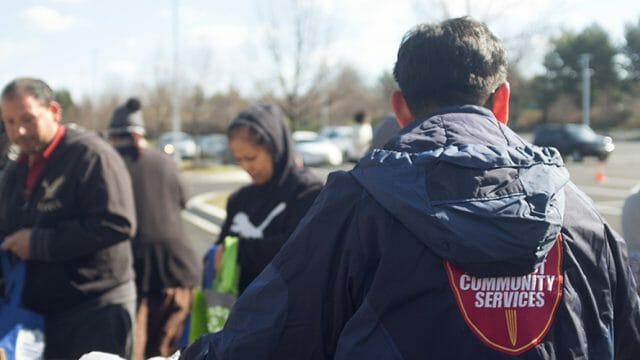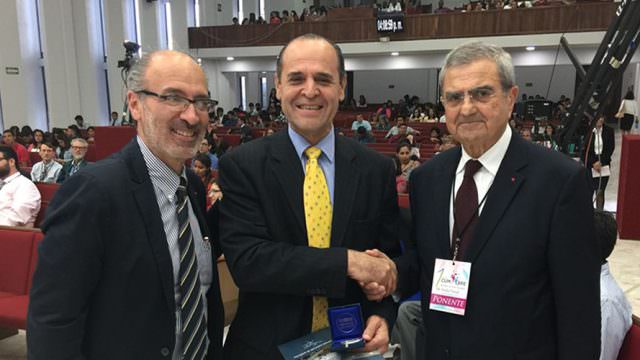The community of God’s people is a community of overcomers.

Fear has always seemed to me to be the worst stumbling block which anyone has to face,” wrote First Lady Eleanor Roosevelt, wife of Franklin D. Roosevelt, United States president during the turbulent times from 1933 to 1945. “It is the great crippler. Looking back, it strikes me that my childhood and my early youth were one long battle against fear.”¹
Fear doesn’t discriminate among age, gender, race, or economic status. Whether we’re young or old, male or female, rich or poor, highly educated or with limited educational opportunities, fear has a way of creeping into our lives. COVID-19 has brought fear closer to all of us. It’s possible that we didn’t become infected, or that our response to the virus was mild and manageable. The economic fallout of this pandemic, however, will be felt by all. Unemployment is soaring around the globe. Stock markets are down. Brands familiar to many of us are fighting for their survival. There are enough reasons to keep us awake at night.
Fear is not entirely negative, though. It keeps us from plunging into a fire or jumping off a high cliff. It controls our fight-or-flight responses. In moments of crisis it keeps us alert and triggers lifesaving reflexes.² Fear is frequently based on past pain. Imagine a person who has never experienced pain. People with congenital insensitivity to pain (CIP), a rare condition in which someone doesn’t feel pain, are at a higher risk of suffering severe diseases because they cannot feel the first signs of a disease.³ Pain and fear are interconnected.
Satan, the archenemy of everything good and hopeful, uses fear to discourage the followers of Jesus. He whispers, “You can’t,” or “God won’t,” or “It’s too late anyway,” or other falsehoods into our ears, causing fear and dread.
THE COURAGEOUS JESUS
American author Mark Twain wrote, “Courage is resistance to fear, mastery of fear—not absence of fear.”⁴ Jesus’ life wasn’t characterized by the absence of fear. Beginning with the circumstances surrounding His birth and childhood, there were many good reasons to be afraid. Yet fear didn’t drive His decisions or shape His choices.
People living in the first century A.D. must have considered Jesus “fearless”—or foolish. He touched lepers (Matt. 8:3). He wasn’t worried about where He would sleep or what He would eat (verse 20). Jesus wasn’t concerned about “catching” ritual impurity by not following rabbinical traditions (Mark 7:5-13). He wasn’t afraid of personal rejection and animosity. He faced that every day as He engaged the Jewish religious leadership (John 5:16-18; 7:1; 8:37-41).
There is, however, one moment in the life of Jesus, clearly described in the Gospels, that is filled with fear and trepidation. Following the last Passover meal, Jesus and His disciples are on their way to the place called Gethsemane. Matthew describes this event in Matthew 26:36-46. Exhausted and drained from a busy day and in anticipation of the things to come, Jesus asks Peter, James, and John to support Him as He agonizes in prayer. Matthew describes Jesus as “deeply distressed” (verse 37), and He openly confides His vulnerabilities to the three disciples. “My soul is exceedingly sorrowful, even to death. Stay here and watch with Me” (verse 38). I wonder if Peter, James, and John just stared at Him dumbfounded. Here is the Man who had calmed a stormy sea, who had fed thousands, who had raised the dead—suddenly asking for prayer support.
This is the battle that Jesus had prepared for all His life. “O My Father, if it is possible, let this cup pass from Me; nevertheless, not as I will, but as You will” (verse 39). Full surrender of our will is the costliest and most difficult offering we can bring. It’s also the one that is the least natural.
We don’t know how long Jesus prayed. By the time He returns to the disciples, He finds them asleep. Ellen White tells us that they barely recognized Him, for “His face was so changed by anguish.”⁵ Three times Jesus prays the same prayer. Was there another way of saving this planet in rebellion that did not involve separation from the Father? “The humanity of the Son of God trembled in that trying hour,” writes Ellen White. “He prayed not now for His disciples that their faith might not fail, but for His own tempted, agonized soul. The awful moment had come—that moment which was to decide the destiny of the world. The fate of humanity trembled in the balance.”⁶
Jesus is afraid—of separation from the Father, for sin separates us from God. Hanging on the cross He cries out, “ ‘Eli, Eli, lama sabachthani?’ that is, ‘My God, My God, why have You forsaken Me?’ ” (Matt. 27:46). Where is God as Jesus agonizes under the weight of carrying the sin of the world? “In that thick darkness God’s presence was hidden. . . . God and His holy angels were beside the cross. The Father was with His Son. Yet His presence was not revealed.”⁷
OVERCOMING FEAR
Contrast our fears with the one fear felt by Jesus. When we worry about life and health and relationships, we forget that the One who overcame all fear and carried our sins is more than able to give us what we truly need. The contours of the one fear we see Jesus struggling with on the cross is separation from God. Is it possible that Scripture’s constant reminder “to fear God” reminds us of the life-giving importance of safeguarding our only link to life— real life—through Jesus? When we “fear” God, we recognize our dependence on the Saviour’s grace. We know that safety can be found only in Him.
Here are three steps to overcoming the fears battering our lives.
First, we become conscious of our fears and recognize them for what they are. Some of them are real; others are perhaps only imagined. All of them affect our entire being. Jesus praying in Gethsemane and shouting “Eli, Eli, lama sabachthani?” on the cross encourages me to express my fears to trusted people around me—and to God. Experiencing fears is not a sign of weakness or lack of faith.
Second, once we are conscious of our fears, we commit to seek help. This requires courage, for it means that we recognize our own inability to tackle the source of the fear. Nelson Mandela, the first president of postapartheid South Africa, wrote in 1995: “I learned that courage was not the absence of fear, but the triumph over it. The brave man is not he who does not feel afraid, but he who conquers that fear.”⁸
Overcoming fear doesn’t come easily. We recognize our inability to overcome—and then run into the everlasting arms of our heavenly Father, who gave everything so that we may live life abundantly and without fear. Consider these promises: “The Lord is my light and my salvation; whom shall I fear? The Lord is the strength of my life; of whom shall I be afraid?” (Ps. 27:1). “God is our refuge and strength, a very present help in trouble. Therefore we will not fear, even though the earth be removed, and though the mountains be carried into the midst of the sea” (Ps. 46:1, 2). God on our side changes everything.
Finally, God created us communal beings. The COVID-19 pandemic has illustrated how much we need people around us. We need their touch, their hugs, their encouragement—and sometimes also their critique. Community means that we’re not alone in our fears. Others have already walked where I am walking right now. Others have already overcome what I am struggling with. The community of God’s people is a community of overcomers.
I JUMP WITH YOU
Suicide Gorge is a unique adventure hike in the scenic Boland Mountains in the Western Cape of South Africa. The hike covers 17 kilometers (11 miles) and takes an entire day. It’s a “wet hike” full of adrenaline-pumping outdoor adventure and high jumps into dark pools of icy water. Once a hiker has entered the gorge, there is no way back. The canyon walls are steep and cannot be climbed without mountaineering equipment. It’s only forward.
I lived for six years in Somerset West, South Africa, about an hour ’s drive from Suicide Gorge. During those years I hiked the trail at least three times with friends, for one never attempts something like this alone.
I remember one memorable moment. My friends and I had left early and had been hiking and jumping for hours. We had just arrived at the point of the highest jump of the day that everybody had to take—at least 12 meters (39 feet). There were, of course, higher jumps, but in most cases, one could climb down and thus reduce the height of the jump. This jump, however, didn’t offer this option.
I had jumped early on and was waiting in the water to see the rest of our group jump after me. Suddenly, there was movement on the top, and to my surprise, I saw my brother-in-law Jëan with another group from our high school. I hadn’t even known that they had also planned to do the trail on that Sunday. All of my friends had jumped by now—except for one. His eyes were wide with panic, signaling fear. He just couldn’t jump. Everyone was waiting in the pool to continue the hike, but Jëan and my friend just didn’t jump. We tried everything. We cajoled, we encouraged, we shouted, we cheered. Nothing worked. My brother-in-law kept talking to my friend. I knew that he had done this trail before. Suddenly, there was a movement, a shout, and two bodies hurtling hand in hand into the pool. Jëan had realized that no argument would have made my friend jump. So, finally, he just took his hand—and jumped with him.
When fear numbs our minds, we need someone who will jump with us and help us overcome our fears. Jesus, who Himself overcame fear by hanging on to His Father, is ready to take our hands and jump with us. The most devastating medical diagnosis, the darkest financial situation, the deepest relational crisis—Jesus is ready to join us and make us, too, overcomers, for “there is no fear in love” (1 John 4:18).
¹ Eleanor Roosevelt, You Learn by Living: Eleven Keys for a More Fulfilling Life (Louisville, Ky.: Westminster John Knox, 1983), p. 25.
² Ruben Castaneda, “The Upside of Fear,” U.S. News and World Report (2018), https://health.usnews.com/wellness/mind/slideshows/the-upside-of-fear.
³ See https://en.wikipedia.org/wiki/Congenital_insensitiv-ity_to_pain.
⁴Mark Twain, Pudd’nhead Wilson, in The Century Magazine 47, no. 5 (1894): 772.
⁵Ellen G. White, The Desire of Ages (Mountain View, Calif.: Pacific Press Pub. Assn., 1898, 1940), p. 689.
⁶ Ibid., p. 690.
⁷ Ibid., pp. 753, 754.
⁸ Nelson Mandela, Long Walk to Freedom (1995), https://en,wikiquote.org/wiki/Fear.








